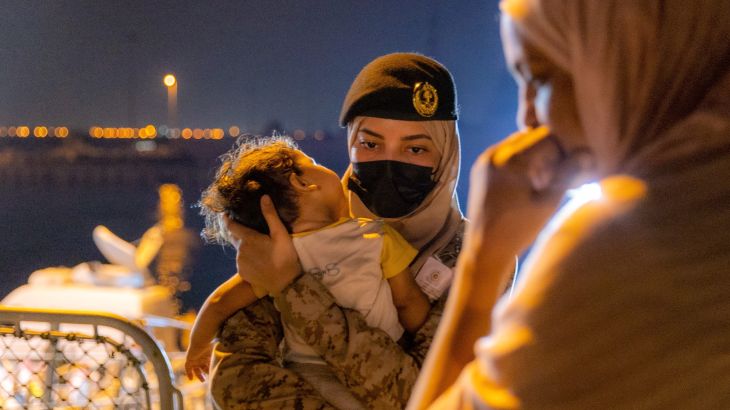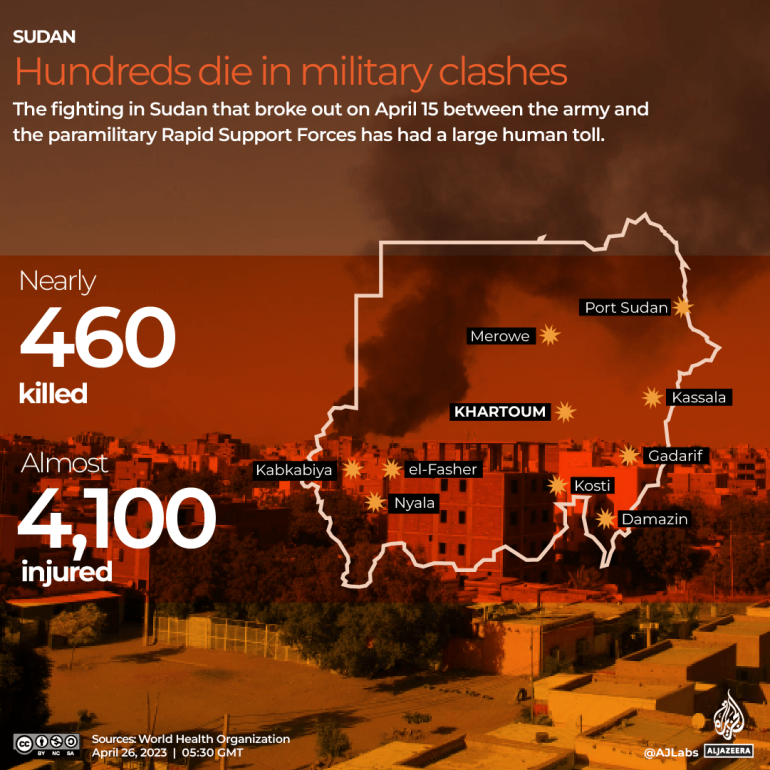Why the US evacuation from Sudan left Americans behind
Most of the estimated 16,000 Americans believed to be in Sudan right now are dual US-Sudanese nationals.

Warring factions trying to seize control of Sudan have plunged the country into chaos, and thousands are fleeing the capital of Khartoum and nearby battle zones.
Some countries have shuttered their embassies and many are coordinating daring evacuations of their staff and other residents in an array of convoys, flights, boats, and frantic getaway drives.
Keep reading
list of 4 itemsFear, guilt and hope in Sudan
Sudan: How are civilians impacted by the ongoing conflict?
Humanitarian fears as thousands of Sudanese flee to Chad on foot
But over the past week, there have been dramatically different responses by various governments as they try to get their citizens and embassy personnel to safety.
The United States has come under scrutiny for evacuating roughly 70 embassy staff in a helicopter mission by elite SEAL commandos over the weekend while warning thousands of private American citizens in Sudan there would be no similar evacuation for them.
The State Department, which has advised US citizens for years not to travel to Sudan, continues to advise Americans to shelter in place. Most of the estimated 16,000 Americans believed to be in Sudan right now are dual US-Sudanese nationals and only a fraction of them have expressed a desire to leave.
But at least some of those who want to get out have managed to get to Port Sudan where they can take a ferry to Jeddah, Saudi Arabia, or have gotten seats on flights operated by other countries.
A look at the situation:
How the US got embassy staff out
As security conditions worsened late last week, including damage to the civilian airport and an attack on a US diplomatic convoy in Khartoum, the State Department concluded “the only way we could do this safely for all of our diplomatic personnel was to rely on the capabilities of our military colleagues”, said Ambassador John Bass, State Department undersecretary for management.
On Saturday, the US embassy in Khartoum suspended its operations and ordered staff to leave the country.
The Pentagon has begun moving resources to Camp Lemonnier in Djibouti to prepare for a possible evacuation. On Saturday, three MH-47 Chinook helicopters carrying SEAL commandos took off from Djibouti en route to Ethiopia, where they refuelled and then made the three-hour flight to Khartoum.
“The operation was fast and clean with service members spending less than an hour on the ground in Khartoum,” said Lieutenant-General DA Sims, director of operations at the Joint Staff. The helicopters flew in and out of Khartoum without taking any fire.
Americans still in Sudan
While embassy staff were airlifted out, there are no plans to provide similar evacuations for potentially thousands of Americans still in Sudan.
In a security alert on Tuesday, the State Department reiterated, “Due to the uncertain security situation in Khartoum and closure of the airport, it is not currently safe to undertake a US government-coordinated evacuation of private US citizens.”
Instead, it provided details on border crossings that are available and the requirements needed at each location. It cautioned that fighting continues and many routes are dangerous and unpredictable.
American citizens who get to Port Sudan overland and can take a ferry to Jeddah will be assisted by the US consulate there. Right now, the US assistance for Americans is largely limited to phone and virtual help.
The US could send navy vessels to Port Sudan to ferry Americans to Jeddah or another location where they could get transport back to the US. However, officials say this would depend on the security situation and whether it is safe for ships to dock.
The US has developed other options such as opening a temporary consulate in Port Sudan, beefing up its consulate in Jeddah to assist Americans as they arrive, or utilising a nearby airfield that other European countries have used to fly citizens out.
American officials say the security situation in Port Sudan is better than in the capital, but remain concerned about the potential for an escalation of violence.

What are other countries doing?
While the US says it is too dangerous to get its citizens out, other countries are proceeding with evacuations of their nationals.
France, Germany, Italy, the United Kingdom, Spain, the Netherlands, Turkey, Japan, South Korea, Jordan, South Africa, Egypt and Saudi Arabia are among the countries that evacuated their citizens and those of other countries.
Germany’s defence ministry said it ended its evacuation flights after flying more than 700 people out of Sudan, including 200 Germans and hundreds more from more than 20 other nations.
France said it evacuated more than 930 people from 41 countries and would keep a navy frigate at Sudan’s main Red Sea port to continue assisting rescue operations for foreigners.
The UK was continuing its military evacuations of civilians from an airport outside Khartoum, but it may not be able to continue when a ceasefire ends – something to happen later on Thursday. Foreign Minister James Cleverly said people should try to reach British flights out of the country immediately.
“Now is the time to move because when the ceasefire ends my ability to give the kind of limited assurance I can give now might go and we might not be able to evacuate,” Cleverly told Sky News television.
Saudi Arabia’s state-run news service said it evacuated about 2,150 people by ship from Sudan, including 114 Saudi citizens and more than 2,000 evacuees from 62 other nations.
And Egypt, which evacuated more than 1,500 of its citizens, said its diplomatic mission will not leave Sudan until it ensures the evacuation of all those who want to leave. An administrator with the Egyptian embassy in Khartoum was shot dead on Monday, the foreign ministry said.
Is the US response unusual?
While many Americans may recall the dramatic 2021 evacuation of diplomats and private citizens alike from Afghanistan, those circumstances were far different. In most cases, the US does not evacuate private citizens when it closes an embassy.
The situation in Afghanistan was different because the US was ending a 20-year military presence in the country. It was trying to extricate the residual American presence there, much of which was directly tied to Washington’s role in propping up the Afghan government. No such situation existed or exists in Sudan.
More typical has been the practice in places such as Yemen, Syria and Venezuela, where the US suspended diplomatic operations and removed personnel because of turmoil, but did not evacuate private citizens.
The US also briefly shuttered the embassy in Kyiv because of the Russian invasion, but there was no military evacuation for either diplomats or private citizens, and the embassy has since reopened.
In contrast with the situation in Afghanistan, the US was not involved militarily in the Sudan conflict and had no military presence on the ground apart from the small number of Marine guards at the Khartoum embassy.
Also, the US has warned Americans for several years not to travel to Sudan and told them consular assistance at the embassy was extremely limited.